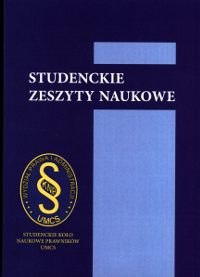Kradzież jako przestępstwo materialne ścięte – jak ustalić czas skutku?
The Theft as an Offence with Curdle Criminal Consequences – How to Determine the Time of the Consequence?
Author(s): Tomasz TyburcySubject(s): Criminal Law, Sociology, Sociology of Law
Published by: Wydawnictwo Naukowe Uniwersytetu Marii Curie-Sklodowskiej
Keywords: theft; criminal offences against property; misappropriation; result of criminal offence; consequence of theft
Summary/Abstract: Theft is committed at the moment of seizure of a movable property (taking the actual control over it), if the performance of such action is accompanied by the intention of its misappropriation; therefore the consequence of the theft occurs regardless of the perpetrator’s ability to realize the intention to dispose of property in question as its actual owner. The degree of consolidation of the control over the stolen property does not belong to the constituent elements of theft. The misappropriation is merely the objective of the perpetrator; it can be fully realized only after the factual seizure. In some instances determining the time of theft raises a serious controversy, for example in case of theft occurring in an apartment of the victim or a self-service shop. The doctrine has widely accepted that theft is an offence with criminal consequences. It seems, however, that when it comes to this particular offense so called “time curdling” occurs – the identity of time and location of the act and its consequences. That is the reason why, in contrast to other types of offenses, in this case it is not possible to distinguish the act and its consequence.
Journal: Studenckie Zeszyty Naukowe
- Issue Year: 19/2016
- Issue No: 31
- Page Range: 73-82
- Page Count: 10
- Language: Polish

